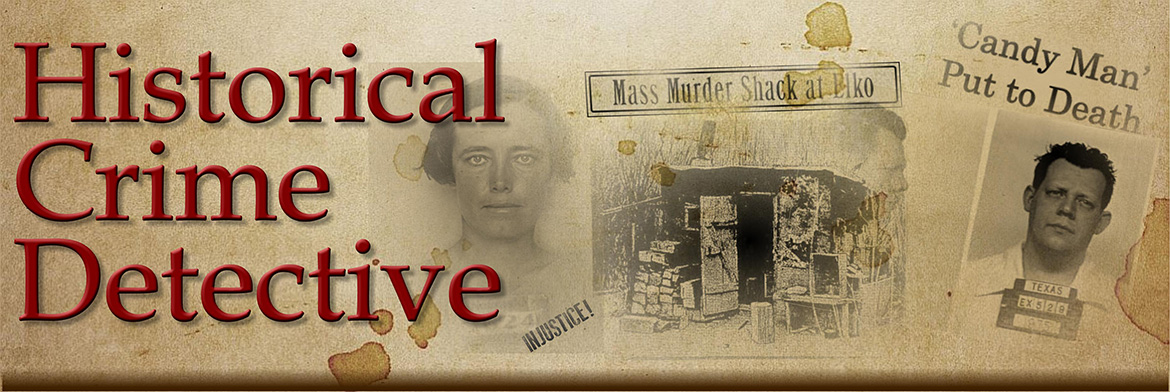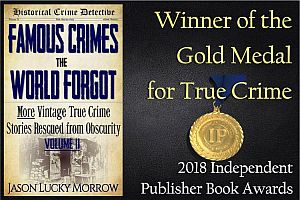The Murder of New Orleans Police Chief David C. Hennessey, 1890
Story by Thomas Duke, 1910
“Celebrated Criminal Cases of America”
Part III: Cases East of The Pacific Coast
In the early part of 1890, an Italian named Provenzano, enjoyed a monopoly of the unloading of fruit and other profitable dock work in New Orleans. Another Italian named Matranga, who conducted a saloon, became envious of Provenzano and decided to procure a portion of this profitable business. He therefore gathered about him numerous adherents and it was decided to begin operations on a large scale.
The bitterest feeling arose between the two factions. One morning in July, Provenzano’s men were en route to the dock in a wagon shortly before daybreak, when several assassins, armed with shotguns loaded with buckshot, waylaid them as they passed through a dark alley. Two men were killed and several were seriously wounded.
Chief of Police David C. Hennessey began a vigorous fight against those suspected of being implicated in this assassination, and in an interview stated that their arrest would occur shortly and that he had an abundance of evidence to convict them, not only of this outrage, but of numerous other depredations which had recently been committed.
About midnight on October 15, 1890, the Chief started to walk to his home on Girod Street, and when he turned into this street from Basin Street, three men, who had been concealed in a doorway, jumped out and began firing at him. He was virtually riddled with bullets, but he succeeded in drawing his own pistol from which he fired four shots, none of which took effect as far as is known.
The Chief died shortly after being wounded and as result of the assassination the feeling against the lower class of Italians became so intense that they feared to venture out upon the streets.
Among the eleven men arrested on suspicion of having participated in the murder was Antone Scaffide. On October 17, a young man named Joseph Duffy called at the jail and asked to see Scaffide. When the prisoner was brought before him, Duffy whipped out a revolver and fired at Scaffide, the bullet inflicting a painful but not serious wound in the neck. When asked his reason for committing the assault, he stated that he only wished there were more men like himself in New Orleans.
On December 22, several of the accused Italians were placed on trial and they pleaded not guilty. It was claimed that several of the jurors were either intimidated or corrupted. At any rate none of the defendants were convicted—much to the disgust of many of the citizens of New Orleans.
Believing that the trials throughout were a travesty on itstice, several of the most prominent citizens concluded that the people must assume the authority which had been delegated to the courts. They therefore issued a call for a mass meeting at Clay Square at 10 a. m., on March 14, 1891, and it was suggested that those who responded should come prepared for action. At the appointed time several thousand persons congregated, and addresses were made by three of the leading lawyers of the city, who stated that the time had arrived when the people must administer justice themselves.
They then proceeded to the arsenal, where shotguns and rifles were furnished. They then went to the prison. After sweeping the small force of police and deputy sheriffs aside, they commanded Captain Davis to open the door, but as he ignored the order the door was broken open by the use of axes and battering rams. The turnkey was relieved of his keys and the crowd then had access to the whole prison. The Italians who were confined in the prison awaiting a new trial, had been secreted in the female ward, but the crowd soon located them, and the prisoners crouched in the corners of the cells begging for mercy. Their cries fell on deaf ears, for they were riddled with bullets. One man named Pollize, after being killed was hanged from a window, as a warning to others.
The following is the list of those killed: Joseph Macheca, Manuel Pollize, Antonio Scaffidi, Antonio Bagnetto, Frank Romero, Lorenzo Comitz, Vincent Caruso, Antonio Marchesi, Charles Trahina, Rocca Geracci and Pietro Monasterio.
After these eleven men were killed, Attorney W. S. Parkerson advised the crowd to disperse, which they did, atter carrying him on their shoulders to Clay Square.
Mayor Shakespeare of New Orleans, when asked if he regretted the killing of the Italians, is said to have replied as follows:
“No, sir; I am an American citizen and I am not afraid of the devil. These men deserved killing and they were punished by peaceable and law-abiding citizens. They took the law in their hands and we were forced to do the same.”
For several days after the wholesale killing, Italians held indignation meetings throughout the country, and it was thought for a time that international complications would arise.
On April 3, the grand jury of New Orleans indicted two of the trial jurors in the Hennessey murder case on the charge of accepting bribes, and Dominick O’Malley, a private detective, Thomas McCrystal and four others were indicted for attempting to bribe jurymen. McCrystal made a confession in which he implicated O’Malley, but as his statement could not be corroborated, the charge against O’Malley was dismissed. McCrystal pleaded guilty.
No action was ever taken against those who participated in the killing of the Italian prisoners, but President Harrison’s attention was called to the occurrence by representatives of the Italian government, and after a complete investigation of the matter, 125,000 francs was offered as an indemnity by the American government and accepted by the Italian government. This money was paid from a special fund carried in the Diplomatic Appropriation Bill, and was delivered to the heirs of the men killed.
—###—



